Dragons Forever (1988)
Directed by: Corey Yuen, Sammo Hung
Written by: Gordon Chan, Yiu-ming Leung
Starring: Jackie Chan, Pauline Yeung, Sammo Hung, Yuen Biao
AKA FEI LUNG MANG JEUNG
Hong Kong
AVAILABLE ON BLU-RAY AND DVD
RUNNING TIME: 96 mins
REVIEWED BY: Dr Lenera
A fishery is seeking court action against a chemical factory for polluting the water, so the company hires sleazy lawyer Jackie Lung to find information that will discredit the fishery. Lung recruits arms dealer friend, Luke Wong Fei-hung, to woo the fishery owner, Miss Yip, to try to convince her to settle out of court, and crazy thief Tung Tak-hiao to bug her apartment, while he sets his sights on Yip’s cousin Wen Mei-ling , an environmental scientist who’s going to testify on Miss Yip’s behalf. Unfortunately, Luke and Tung are unaware of each other’s roles, romance whether fake or real is complicated, and what’s the secret of the factory?….
The three films featuring the triumphate of childhood Peking opera buddies Jackie Chan, Sammo Hung and Yuen Baio in a way sum up all that was great about the golden age of Hong Kong cinema, the only problem being to decide which is the best, setting aside for a moment those two hugely uneven ‘Lucky Stars’ films where a bunch of largely unfunny comedians were the main focus. I’ve fluctuated. When I first got into Chan, it was their first collaboration Project A which was tops for me and which remained so for many years. Then Dragons Forever, the title of which was obviously referring to the three and with hindsight seems both sad and ironic as it was their last film, took the lead and maintained it until – well – now really. Maybe it’s viewing the films with a more critical eye which has pushed Wheels On Meals into first place and Dragons Forever into third place, though that’s not to say that Dragons Forever is still not a great experience in its own right. It looks cheaper than the other two and feels less cohesive, though having the action and comedy being more independent of each other was clearly intended. But having all three leads play guys on the wrong side of the law is refreshing, they all do very fine work – for some reason Hung and Baio really up their game acting-wise while Chan gives one of his best fighting performances – the character writing is especially strong especially Baio’s, the unusual emphasis on romance is surprisingly pleasing and adds a sweetness to the whole endeavour, the humour mostly works, and Chan’s rematch with his Wheels On Meals opponent manages to be totally different, it’s amazing how they achieved this. It’s still a film which is often quite wonderful.
The three actually didn’t get on very well during some of the making of this one, largely because Hung, who co-directed this with Corey Yuen, and Biao were jealous of Chan’s huge popularity, though Chan and Hung had been at odds for some time, Hung being annoyed at Chan for not agreeing to appear in his all-star Millionaire’s Express [which is a terrific film by the way, I hope 88 Films or Eureka are eyeing it as I type!], and Chan fed-up with being lumbered with Hung’s gambling problems. On set the two would argue over how scenes were staged while Biao just felt ignored and alone, though as time went by things improved. Urquidez was brought in at the last moment when they couldn’t decide how to end things. When Chan rang him, Urquidez agreed to so it as long as he was sent a script, something meant as a joke because scripts for Hong Kong movies were often written concurrently during shooting. To his surprise, he was sent one which just missed the final act. Dragons Forever did okay box office in Hong Kong but wasn’t the smash expected and in Japan, Chan’s biggest market, it outright flopped. It’s possible that this was due to the three stars playing against type, and it has even been said that Japanese fans objected to Chan wearing a suit and being a womaniser. Presumably because Baio wasn’t as popular, two scenes featuring his character Timothy Tung Te-Biao were cut from the Hong Kong version to the film’s detriment; a genuinely funny visit by his character to his psychiatrist, and a later one which is less funny but its exclusion means that another scene soon after makes little sense. These remained in the Japanese version and even the ‘international’ version, though the latter omitted a few other bits such as Lung singing, a waiter asking Miss Yen if she wants to use the toilet, part of the second courtroom scene, and the trio’s discreet entry into the factory.
We begin by meeting our main bad guy Hua Hsien-Wu is played by Yuen Wah, basically reprising his performance in Eastern Condors with cigars replacing a fan. Another crime boss has had a shipment interrupted and Hua’s the culprit. As Hua’s men shoot dead the others, it would be totally serious if it wasn’t for Wah’s odd mannerisms and his walking over a settee instead of around it. Chan’s Jackie Lung is first seen wining and dining a young lady, then offering her some money to stop suing a client of his. But some heavies turn up from the client anyway to attack her in a more violent manner than if Chan had helmed this – women can get bashed about in his directorial efforts but it’s usually more comedic. Here, once Chan’s character has fought off the villains, he returns to the woman, she understandably slaps him, and he slaps the already battered woman in the face back! However, even if it wasn’t liked much at the time, I like seeing Chan play this slick, corrupt, smarmy lawyer who asks out every woman he comes across while his assistant is clearly pining for him, and who’s really lecherous with his main love interest as soon as she’s round his house. But then the other two stars are trying to be different too. Hung, first shown selling guns in a deal which goes wrong, projected a timid but honest persona in his last few films but is replaced by a more confident and devious character, while Biao, first seen climbing up his house and entering it through a window in the ceiling, plays an insane guy, albeit one of those who has a view on life that has some logic to it. He may keep fish in a lengthy tube, but to him they reflect the way that he’s “constantly moving forward, never looking back”. Baio, showing a skill for humour of the deadpan kind, refuses to resort to mugging and creates a really quite impressive portrait of a loose cannon who just cannot understand why the world is so different to what it should be like.
Lung gets Hung and Tung to help him in his latest case, defending Wah against Miss Yip who claims that her fishery is being polluted by chemicals from Wah’s factory, but he never told each one about the other person so they keep on bumping into each other and fighting. They even makes a nuisance of himself to Lung when Lung has Wen, the cousin of Miss Yip, round for dinner, and Lung becomes aware of their presence but has to pretend to Miss Yip that it’s nothing. It’s typical farce-like Hong Kong movie stuff but well staged and I do crack a laugh or two. Eventually all three fight each other all at once, as if the Three Stooges knew martial arts. It’s a hilarious sight, and their screen chemistry together is really strong onscreen despite the behind-the-scenes stuff. Some feel that the amount of time given to love lets things down, as Lung and Wong pretend to romance Miss Yip and Wen so they will be less inclined to pursue their case, but find themselves actually falling for them. There’s no doubt that the odd moment seems off, like when Miss Yip whacks Lung [dripping blood but showing no signs of injury afterwards] in the forehead with a large wench after which the two immediately make up, and you get the almost obligatory song over a montage with translated lyrics like “let our touch conduct electricity”. But Wong using a megaphone to get the shy Miss Yip to go out with him on a crowded street is a nice idea. I rather like the simple, un-cynical Hong Kong movie approach to romance, and I always really want both relationships here to work out. Deannie Yip as Miss Yip [lots of actual names in this film] is easily the better of the two female leads, giving a touching portrayal of a woman who finds trust very hard. Her relationship with Hung is really an extension of the ones they had in Carry On Pickpocket and Owl Vs Bumbo, while Biao to reprise his character in Hung’s License To Steal.
The action is less prevalent than in Project A but slightly more than in Wheels On Meals, and the usual stalwarts like Dick Wei and Billy Chow turn up to act villainous and then have the crap kicked out of them. As usual when Hung is in the director’s chair, Chan does less crazy stunts but exhibits more force and, while a few do creep in, outside of the comic encounters between our three heroes, there are far less of the humorous bits that Chan liked to include in his fights. Laughs often come from other sources, like a brawl in a nightclub where our trio fight some hoods and somebody shields Wah from danger only for Wah to keep on trying to get a view of what’s going on. There’s a great bit that goes all over a large boat where Chan battles a load of heavies, the scene that’s the most like a typical Chan fight, with Chan trying to run away and using whatever is on hand. But thrills aren’t to the forefront until the last 20 minutes when it’s revealed what Wah is really up to [which comes as no surprise]. The perennially under-appreciated Biao gets to show off his incredible gymnastics as he and Chan dispatch loads of henchmen, and, while Wah surprisingly doesn’t get to do that much, with even his main fight scene being brief, the Urquidez rematch makes up for this. Seeing as these kinds of scenes would often take weeks to shoot, it’s incredible that this one, due to the production running out of time, was done in just 24 straight hours. Even though it’s broken up by Wah a few times, it’s a much faster affair than the previous Chan/Urquidez fight and, while it obviously displays some amazing martial arts skill, it’s much looser and rougher with elements of street brawling. At one point it looks like they actually hit each other on those nerves on the arms which make them go dead for a few seconds! As usual, Hung tends to employ slightly faster cutting and a wider variety of angles than Chan.
Wong actually being injected with heroin is a surprising moment, something which must be why this still has an ‘18’ certificate in the UK when so many other films of the same rating has been downgraded to a ‘15’. Hung liked to do this sort of thing in his films, add some rather grim stuff to films that didn’t always need it. The set design by Chan film veteran Oliver Wong is one area of this film where it’s obvious that some corners were cut, and there are some notable continuity errors. But I like the way Chin Yung Shing’s music score promotes the romance and the comedy but leaves the action scoring either low-key or non-existent. Sadly the Hi-Def picture does make obvious something that was hard to spot on DVD: that Chan was doubled a few times [mainly by Chin Kar Lok]. But this was actually often the case. He may have promoted himself as doing all his own stunts, but if one considers all the injuries he suffered in the cause of thrilling his audience [virtually every part of his body has suffered some damage], it would have been well nigh impossible for Chan to do everything, his body wouldn’t have been able to take it. Even though Chan not being totally truthful about this is one example of his rather big ego, it certainly doesn’t ruin enjoyment of him and his movies for me, and films such as Dragons Forever are high points of a wonderful period where Hong Kong cinema was one of the most vibrant and creative in the world, and could do action like nobody else. I’d still just about place it in Chan’s top ten; it shows this incredible trio going out in fine style, though it’s such a shame that they never got to do it again. The new Blu-ray from 88 Films amazingly includes all three versions; the slightly longer Japanese version is the one to see, especially as it also includes some out-takes not present elsewhere.

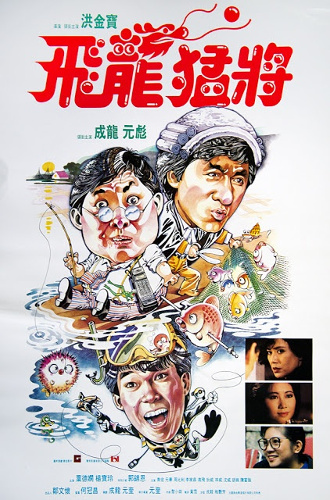
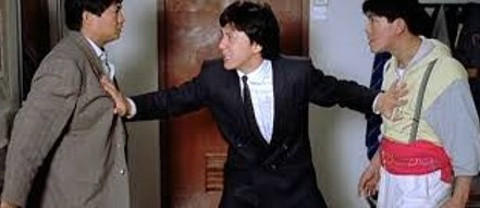
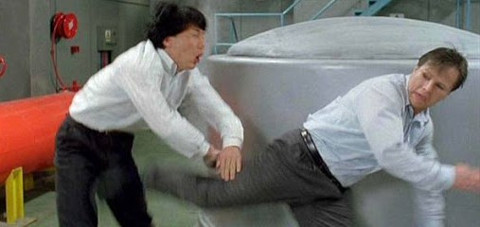



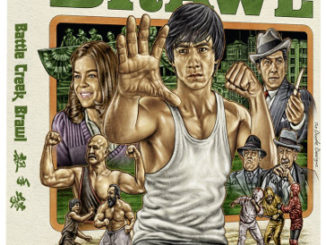
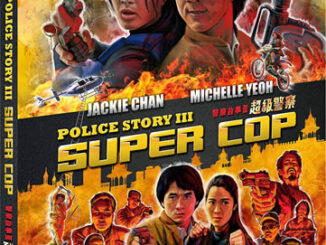
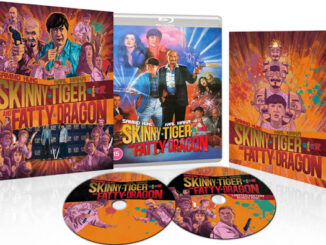
Be the first to comment